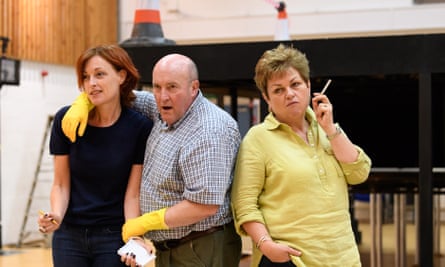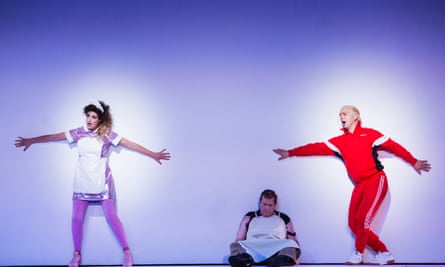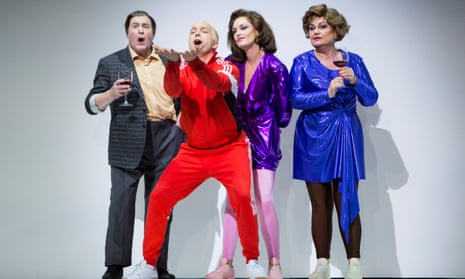‘Fancy my Mum? I’d rather go down on Hitler!” So says Eddy, the hero of Greek, Mark-Anthony Turnage’s opera that shifts the story of Oedipus from ancient Greece to contemporary north London. He’s reacting to a fortune-teller, who says he’ll one day kill his dad and have a “bunk-up with his mum”. No wonder he’s not best pleased.
When I was first approached to direct Turnage and Steven Berkoff’s opera my reaction was along the same lines. “Do I harbour perverse feelings for my mother?” I asked myself. I don’t think so. I’ve always thought of myself as more of a “daddy issues” kind of a guy. So how could I relate to this opera? I felt Oedipus was not the myth for me.
However, as I reach the end of rehearsals, I’m happy to report I was wrong. Not because the process released previously suppressed feelings of mother love, but because I’d misunderstood what the Oedipus myth is – or can be. Like all ancient myths and stories that remain with us today, Oedipus contains a multiplicity of meanings, much like The Passion of the Christ, The Odyssey, and Cinderella. There are many paths through the landscape of Oedipus, many beams of light refracting from the same crystal.

A friend, an avid reader of history, told me a story from the twilight of the British empire. The ruling class had become disturbed by a sequence of violent uprisings. Although each took place in regions hundreds of miles apart, they all followed similar patterns and bore similar hallmarks. An investigation was launched. Was this some kind of conspiracy against the empire? The shadowy body that lurked behind the scenes had to be exposed and eliminated. But it was too late when the British finally found the culprit. It was them. The only thing that actually connected these disparate revolts was that they all happened under British rule. The empire was the poison.
That is the Oedipus story. Or an Oedipus story. King Oedipus searches for the source of the plague that blights Thebes. But this detective story ends with him discovering that he himself is the criminal. The source of the plague is his own house, his own bed. This is a version I find much easier to connect with: the problem in the world is a problem in you. I’ve long been a devotee of the maxim: “When you draw up a list of your own worst enemies, make sure you put your own name at the top.”
When Berkoff wrote Greek in 1980, he drew on contemporary social issues to create the story’s plague, painting a bleak portrait of Thatcher’s Britain. Turnage then gave this social upheaval a raw, percussive expression. This is most striking when Eddy is beaten up by riot police – Turnage instructs the orchestra to stamp their feet, chant swear words and strike riot shields with truncheons. And when, in the opera’s final moments, Eddy discovers that he’s the source of the plague, there is artillery-like percussion again: short, deafening bursts of drums that sound like machine guns, a firing squad that cuts Eddy down. But this time the explosions are personal rather than political. The bombs are in his mind.
There’s another interpretation of the myth: You run away from the thing you most fear, but every step brings you closer to it. Eddy, like Oedipus, flees his family home, hoping to escape the grim prophecy of patricide and incest; but, unbeknown to him, his parents are not his parents, but a childless couple who secretly took in another’s baby and raised it as their own.
As Oedipus heads towards Thebes, and Eddy towards Chalk Farm, both men believe they’re heading away from catastrophe, when actually they’re rushing towards it. Their actions bring about the exact opposite of what they intended. But then that’s the terrible thing about fate. If it’s fated to happen, whatever action you take will only bring it closer.

This too is an interpretation I can get behind. I’ve stayed up half the night cramming for an exam, and so failed the exam. I’ve tried with every fibre of my being to charm and beguile the object of my desires, and come across as desperately weird. And I imagine we all try to live our lives so that we avoid the mistakes of our parents, yet are stunned to find that, in ways we didn’t quite see coming, we have become them nevertheless. Saying that thing, in that voice.
Like many journeys through the Oedipus myth, this path leads us to questions about psychology and the subconscious. Is the thing we fear the most actually the thing we desire the most? Do we crave our own destruction more than our triumph?
Berkoff, Turnage and the opera’s original director Jonathan Moore chose a distinctive way to express how our parents shape our minds. In Greek, Eddy is played by one singer, while the three other singers, who play Eddy’s surrogate parents and his long-lost mum, also perform every other person he meets. So wherever he goes, he sees his family – in the cruddy pub, over the road in the posh wine bar. In the riot scene, Eddy recognises his dad in the truncheon-wielding police chief, as if his father is trying to kill off his son before he can do the same to him. Greek suggests we can’t escape our family, because we carry them in our heads wherever we go projecting their image on to everyone: bosses, friends, lovers.
The operatic form is perfect for expressing this. The way that musical themes repeat in an opera suggests the way that memories constantly replay in our minds. Whatever present moment we’re in, it is coloured by the past bubbling up. Turnage gives Eddy’s memories a musical form: football chants remind him of his working-class adoptive parents; sounds that shimmer like water remind him of being separated from his mother as a toddler, when he fell from a ship into the Thames.
Oedipus might just be one story, but it’s open to 1,000 interpretations. Turnage and Berkoff’s Greek is one of the best I know. Irreverent, punky and playful, it nevertheless creates a feeling of real unease and, in its final stages, contains remarkable beauty. Through Greek I’ve discovered a hitherto unknown love for the Oedipus story. And I certainly didn’t see that coming.
- Greek is at Festival theatre, Edinburgh, part of Edinburgh international festival, on 5-6 August. Box office: 0131-473 2000.

Comments (…)
Sign in or create your Guardian account to join the discussion